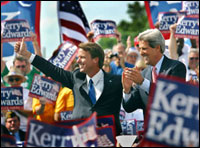
Edwards and Kerry hit the campaign trail.
Photo: Kerry for President.
When John Edwards was tapped to be John Kerry‘s veep last week, everyone interested in ousting Bush erupted into convulsions of praise — and the enviros were no exception.
“An excellent choice that sends a clear message about the need for change and renewed optimism in our nation’s leadership for conservation, public health, and other issues important to the American people,” said the League of Conservation Voters. “Yet another strong environmental leader [on] the Democratic presidential ticket,” said Environment2004. “Sen. Edwards consistently stands up to preserve and strengthen the laws that keep Americans’ air, water, and public land clean and safe,” said Debbie Sease, the Sierra Club‘s legislative director.
So it may come as a surprise that Edwards’ lifetime voting record on the environment, determined by LCV’s scorecard, is 63 percent (that would be a D-) — quite a bit lower than Kerry’s 92 percent, one of the highest records in Senate history.
But Betsy Loyless, LCV political director, insists that one shouldn’t jump to the wrong conclusion about what appears to be a near-flunking grade: “Anything above 60 percent is considered a very solid rating. Keep in mind that the average score among senators in 2003 was 41; and if you look at records of senators from his region, the Southeast, Edwards is definitely one of the highest scorers.”
Also, if you look at Edwards’ voting record year by year, the picture is rosier — he scored 78 in 1999, 100 in 2000, and 88 in 2001, before dropping to 59 in 2002 and then all the way down to 37 in 2003 — a measly score largely attributable to the fact that he spent so much time on the presidential campaign trail that he missed half of the environment-related votes LCV tallied. (LCV counts missed votes as negatives, which also explains why Kerry’s score has dropped from 96 to 92 in the last several months.)
A quick overview of Edwards’ stances on major issues should look pretty appealing to enviros: On energy matters, he has voted against drilling in the Arctic five times, supported a standard that would require 10 percent of America’s electricity to come from renewable sources by 2020, and consistently voted to increase CAFE standards. On global warming, he has rebuked the Bush administration for pulling out of the Kyoto treaty and he supports the McCain-Lieberman bill that would establish a cap-and-trade system to reduce carbon-dioxide emissions. He also supported the “roadless rule,” and he opposed Bush’s Healthy Forests plan, cuts to the Superfund program, and efforts to weaken the Clean Water Act and arsenic standards for drinking water.
Edwards’ most aggressive efforts have been on clean air: Last year, he led the fight against Clean Air Act rollbacks in the Senate, pushing to delay Bush’s proposed changes to the act’s new-source review (NSR) provisions until more research had been done on the public-health consequences. “Edwards has clearly emerged as one of the most dogged new-source review champions — a wonky issue that does not exactly score you a whole lot of glamour points on Capitol Hill,” said Chris Miller, a staffer at the Senate Committee on Environment and Public Works. “Meaning he did it because he believes in it.”
Carol Browner, EPA chief under Clinton, told Muckraker that Edwards’ 20 years as a trial lawyer defending average citizens against corporate and medical malpractice gave him a good foundation for environmental advocacy: “Edwards is great at understanding issues as they relate to people in their lives and their communities. He held an NSR hearing that examined what the [rule changes] would mean to local communities [out of concern] that the consequences would be particularly acute in North Carolina. It’s in part from his experience of representing people who had suffered tragedies and been wronged.”

John Edwards.
Photo: U.S. Senate.
Admittedly, Edwards committed a number of environmental voting gaffes early on in his Senate career, which have caused some in the environmental community to say that only very recently has he become a true believer. During his first year in office, 1999, he voted in favor of an amendment to allow mountaintop-removal mining practices. Later, he voted to exempt pickup trucks from fuel-efficiency standards and supported the storage of nuclear waste at Yucca Mountain in Nevada (though he has since agreed to support Kerry’s position that Yucca shouldn’t become a dumping ground). Edwards also voted against an amendment that would have prevented farm subsidies from helping to expand industrial farms, and voted against stricter prohibitions on the use of pesticides in parks.
“His voting record for the most part is very favorable, but it’s fair to say that environmental issues were not a priority for Edwards during his first several years in office,” said a leading analyst at a prominent national environmental group who asked to remain unnamed. “For a while he was not even close to where we wanted him to be in terms of leading on certain issues, but we got him to come around.”
LCV, the Natural Resources Defense Council, and other groups worked doggedly over the past few years to get to Edwards’ major campaign contributors and convince them that the environment was an important issue for him to lead on. The contributors in turn took their case to Edwards, and, to his credit, he came around.
“We’re a big fan of Edwards because of his turnaround,” said the analyst. “The fact that he was so willing to listen to us, so adaptable and open to our concerns, spoke volumes about his ability to be a dynamic leader.”
Furthermore, Edwards’ main campaign message — that the Bush administration shouldn’t be allowed to keep putting special interests ahead of the public interest — is very much in keeping with environmentalists’ message. “When LCV was deciding which candidate to endorse, Edwards was very appealing because of the way he kept stressing his central message that his campaign is about standing up for the people — the interests of the citizen — in the face of escalating corporate power,” said Mark Longabaugh, LCV senior vice president for political affairs. (LCV ultimately endorsed Kerry.)
Ed Turlington, an old friend of Edwards’ and the former chair of his presidential campaign, told Muckraker that the candidate is very serious about “ensuring that his decision making is as independent as possible from the influence of special interests. From the beginning of his Senate career, he has refused contributions from political action committees (PACs) or from federally registered lobbyists.”
It makes sense, then, that Edwards voted against the nomination of officials with obvious conflicts of interest, including Gale Norton as Secretary of the Interior and John D. Graham as administrator of the Office of Management and Budget’s Office of Information and Regulatory Affairs. Edwards also called for the resignation of EPA Air Director Jeffrey Holmstead.
Turlington adds that environmental matters do strike an emotional chord for Edwards because of the way the mountains of North Carolina have been devastated by acid rain. Edwards has also fought as a senator to keep the Bush administration from drilling off the shores of his state.
One might wonder whether Edwards sees any conflict between his No. 1 priority of job creation and his newfound commitment to the environment. According to Turlington, there’s no concern: “Edwards doesn’t buy that misconception that the two are at odds. In fact, much of his argument for environmental protections in North Carolina is economic: He’s seen clean air and water are good for the economy. Not only do you have healthier workers but you make the state a better place to live — more employers come to your state. The acid-rain crisis in North Carolina has been terrible for the state’s economy, the tourism industry in particular.”
All this is music to the ears of enviros battered by the past three and a half years of eco-assault. But while there are plenty of reasons to believe that a Kerry-Edwards ticket is the most pro-environment America has ever seen, keep in mind that it’s easier to advance an environmental vision in the Senate than in the White House. On Pennsylvania Ave., Edwards and Kerry would have to fight far more aggressive industry forces than they have before, not to mention juggle the environment with other priorities like shoring up the economy, extricating the U.S. from Iraq, and tackling the health-care crisis.
Many faulted Al Gore (perhaps unfairly) for putting his lifelong environmental leadership on the back burner during his tenure as veep. Those same skeptics may wonder whether Edwards will abandon his green advocacy as quickly as he adopted it.
But faced with a choice between the villains they know and the heroes they hope for, few enviros will hesitate in the voting booth on November 2.

